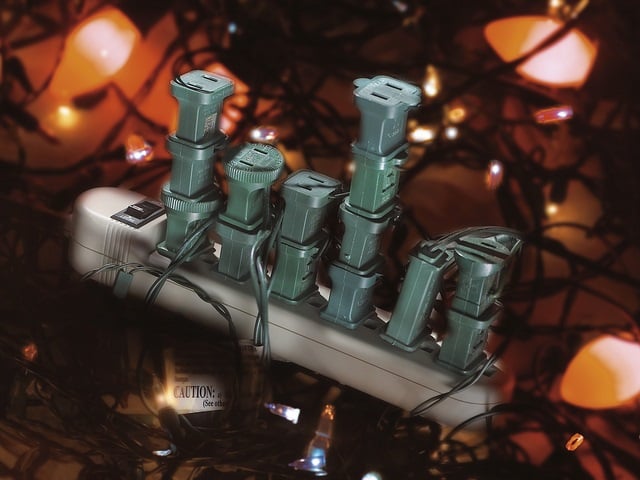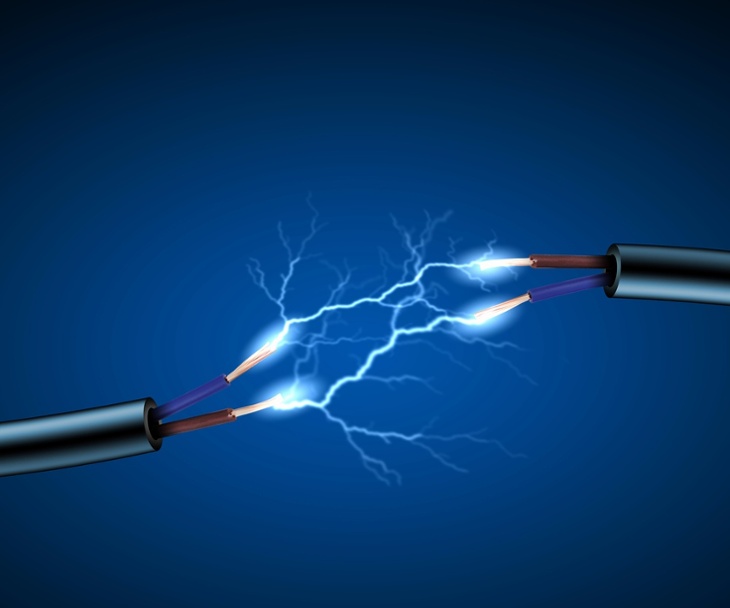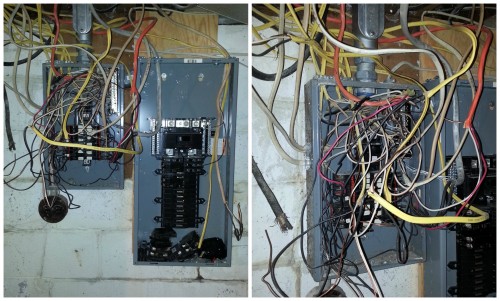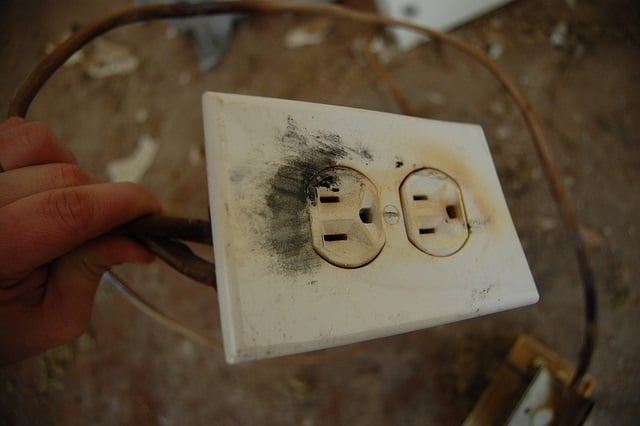Updated December 2025
Faulty electrical wiring is a leading cause of property damage and serious injury due to fire. Many fires in Canada are caused by bad wiring—brought on by poor maintenance and incorrectly installed components.
Overly confident homeowners attempting DIY electrical projects are one part of the problem. Another issue is lack of knowledge regarding wiring safety procedures and danger signs.
Throughout your electrician career, it is very likely that you will encounter these six common signs of bad wiring while on house calls. While correcting the problem is priority number one, another key objective will be to educate homeowners on the risks they take when completing electrical work themselves—or ignoring clear signs that maintenance is urgently needed.
1. Messy, Overloaded Fuse Box or Electrical Panel
This happens more often than you might think! Disorganized fuse boxes or electrical panels (like the one pictured below) are an obvious hazard. Whether caused by neglect or a DIY attempt gone terribly wrong, it will take a licensed electrician to sort out this mess. Chaotic, overloaded panels end up exceeding safety capacity, suffer from repeatedly blown-out breakers, and put homeowners at serious risk for fire.
Messy electrical panel (Image credit: Midwest Comfort Homes Electric)
2. Lights That Buzz, Flicker, or Dim
Homeowners tend to ignore flickering lights. So long as the light hasn't burned out completely, the issue of dimming or even a low-grade buzz is often considered a non-emergency.
Unfortunately, lights that frequently misbehave are a clear indication of outdated wiring, loose wires, or an overloaded circuit. These are all problems that demand the immediate attention of a qualified electrician. It may be necessary to bring wiring up to code, move the dimming lights to different circuits, or install dedicated lines for energy hogs—like major appliances.
3. Discoloured, Hot, or "Smelly" Outlets
Browned outlets that produce a burning smell (or feel hot to the touch) signal heat buildup, and potentially, an electrical fire in progress. Faulty wiring or a loose connection near the outlet or switch can produce a short, which causes the outlet to arc—leading to a brief fire.
The mini-fire produced by the outlet short will have an acrid smell. A full-on burning smell likely means the short is in the wall wiring and has spread fire to surrounding materials. Both are very serious signs that the circuit requires close and immediate examination by an electrician.
Charred outlet that was the source of a fire (Image credit: Choking Sun)
4. Breakers & Fuses That Trip Too Often
Breakers and fuses are supposed to trip when the circuit begins to overload. This is a safety precaution. However, when circuit breakers trip regularly, it's a sign that something has gone seriously wrong. The homeowner may have too many high amp appliances plugged into a single circuit or there may be a short in the wiring somewhere along the circuit.
5. Switches, Outlets, or Appliances That Deliver a Shock
When an outlet or switch delivers a shock, it's a sure sign that the device is bad or that there's a short in the circuit. Sometimes an appliance will also cause tingling or a shock when touched. In this case, a ground fault in the appliance could be the cause, or improper (likely amateur) wiring. Too often, homeowners write off these issues as "static," particularly when the home is carpeted.
6. Overloaded Outlets (the "Octopus" Problem)
Most people don't think twice before plugging yet another extension cord into an outlet. "Octopus" outlets are a common occurrence in many homes and offices.
However, using extension units creates opportunities for cords to kink or short out, which can lead to tripped breakers and damaged outlets. Electricians must educate home and business owners about the dangers of relying on extension cords as permanent wiring solutions—rather than simply getting more outlets installed.
It's expected that extensions may be needed during the holidays, for example, but even then, it's crucial to ensure they are used sparingly and only for short periods of time.
 Overloaded outlets can be a serious safety hazard (Image credit: State Farm)
Overloaded outlets can be a serious safety hazard (Image credit: State Farm)
And there you have it. Just a few of the most common electrical issues you'll encounter on the job as a licensed electrician.
Interested in becoming an electrician and have questions about electrician training and certification?
Herzing College offers a 24-week pre-apprenticeship electrician program that can help you get started in the trade. The training is available in Ottawa, Toronto, and Cambridge.
Reach out to an admissions advisor for information on courses, costs, financial aid, how to apply, and more.
Chat live with an advisor now. Or click below to explore the electrician pre-apprenticeship program in more detail. We're here to help!








